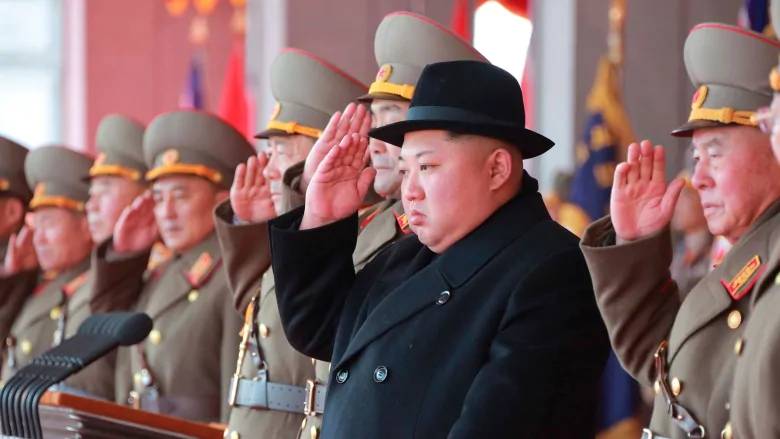US and North Korea Deadlock
November 13, 2018 | Expert Insights

North Korea cancelled nuclear talks between US Secretary, Mike Pompeo and North Korean General Kim Yong-chol after a US refusal to offer sanctions relief.
Background
The political and diplomatic relations between North Korea and the United States have been historically hostile, developing primarily during the Korean War. In recent years relations have been largely defined by North Korea's nuclear program– six tests of nuclear weapons, its development of long-range missiles capable of striking targets thousands of miles away, and its ongoing threats to strike the United States and South Korea with nuclear weapons and conventional forces.
The US and the UN have placed tough economic penalties on North Korea. Around 90% of its exports are banned including coal, iron ore, seafood and textiles. There are also caps on the amount of oil it can buy. If Kim Jong-un is going to build up his economy as he has promised his people, then he will need the sanctions lifted. The US has underlined that there will be no sanctions relief until "complete denuclearisation".
Analysis
South Korea’s foreign minister has stated that U.S. officials informed Seoul that North Korea cancelled nuclear talks between U.S. Secretary of State Mike Pompeo and senior North Korean General Kim Yong-chol. The meeting was cancelled after the US State Department discovered that the North Koreans didn't get on the plane as planned. There was no reason provided aside from “busy schedules”.
North Korea cancelled the meeting in New York that was meant to discuss ridding the North of its nuclear weapons and setting up a second summit between U.S. President Donald Trump and North Korean leader Kim Jong Un. The U.S. president has recently appeared to be slowing the pace of diplomacy with North Korea amid signs that Kim is lagging behind in his supposed promise to denuclearize. Trump said he wouldn't play a "time game" with North Korea over a denuclearization deal, while his national security director, John Bolton, said a second Kim-Trump summit won't happen until 2019. Mr Trump said he's "very happy" with how things are going, and that he's in "no rush" while sanctions remain in place.
Trump and Kim held a summit in Singapore in June, where they announced ambitious goals for a nuclear-free Korean Peninsula without describing how and when it would occur. But North Korea has since insisted that U.S.-led sanctions against it should be lifted before there will be any progress in nuclear negotiations.
After his June meeting with Kim, Trump raised security jitters in Seoul by abruptly cancelling major U.S. military exercises with South Korea which North Korea had termed invasion rehearsals. North & South Korea also disarmed the Joint Security Area as a progress on North Korea’s promise to denuclearize. North Korea stopped testing missiles and nuclear weapons, which President Trump took as a personal victory. Mr Trump declared that "there was no longer a nuclear threat from North Korea". North Korea also pledged to close the Yongbyon nuclear facility where it is believed to produce fissile material for nuclear weapons, if the US takes corresponding measures.
North Korea's nuclear arsenal has been labelled an urgent problem by US defence and intelligence chiefs. Several studies by US intelligence and by the UN suggest that North Korea has not stopped its building or stockpiling of weapons. After Trump’s refusal on easing the sanctions, Pyongyang issued a threat in a statement from Foreign Ministry's Institute for American Studies. It claimed that "the improvement of relations and sanctions is incompatible", and that the US was "bragging arrogantly without showing any change in its stand, while failing to properly understand our repeated demand”. North Korea has warned it could revive a state policy aimed at strengthening its nuclear arsenal if the United States does not lift economic sanctions against the country.
South Korea's President Moon Jae-in said that he expected "bumps and bruises" on the way as the international community tries to persuade North Korea to disarm. Russia called a meeting this week of the United Nations Security Council to discuss sanctions on North Korean banks. The United States blocked the attempt by Russians to ease UN sanctions on North Korea in what it claimed was an effort to deliver humanitarian aid to the impoverished nation. The US Ambassador to the UN, Nikki Haley, was unequivocal: "The threat is still there. North Korea still has nuclear facilities and they've still not allowed inspectors in to inspect them."
On Nov 12th, South Korea resumed small-scale military drills with the United States which is in violation of the September 19th agreement aimed at lowering tensions on the Korean peninsula The Korean Marine Exchange Program (KMEP) agreement signed by North and South Korea called for a halt to “all hostile acts,”. North Korean leader Kim Jong Un and U.S. President Donald Trump had pledged to work toward denuclearization at the June summit in Singapore, where Trump promised to end joint U.S. - South Korea military exercises.
Assessment
Our assessment is that the standoff between North Korea and US will continue until North Korea agrees to completely denuclearize. But in Korea, Kim Jong-un is surrounded by military hardliners who are not willing to disarm, nor do they wish to be seen as bowing to US requests. Before they make another move, they want the US to respond with an ease on sanctions which has not yet happened and we feel that this may not happen during Trump’s regime.








Comments